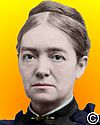
On 31 Aug 1842, Mary Corinna Putnam was born, who after marriage became known as Dr. Mary Putnam Jacobi, an American physician. She was well-respected for her medical abilities and was the first female member of the Academy of Medicine.
Jacobi was awarded Harvard University's Boylston Prize for her 1876 essay, The Question of Rest for Women during Menstruation. In this work, she refuted allegations of the physical limitations of women, such as published by Dr. Edward H. Clarke's in Sex in Education (1873). She supported her position with scientific data including sphygmographic tracings of pulse rate, force, and variations to confirm that a woman maintained vigorous health throughout her monthly cycle.
When she died, among those giving respects in memoriam was Dr William Osler. As you read his In Memoriam: Mary Putnam Jacobi, beyond the customary kindness, you can read into his remarks how the tide had turned for the acceptance and recognition of the contributions that women could and should then be able to give to science and medicine.
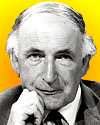
On 31 Aug 1913, Sir Bernard Lovell was born, the English radio astronomer who established and directed the Jodrell Bank Experimental Station, Cheshire, England, with (then) the world's largest steerable radiotelescope. With experience in cosmic ray research, and wartime work on radar, in 1946, he showed that radar echoes could detect optically invisible daytime meteor showers. Lovell gained funding to build the 250-ft-diam. telescope. When completed, it was able to track the first artificial satellite, Sputnik I. Today's book pick is: , by . He gives the first-hand account of the political and scientific interplay that took place in Great Britain during two critical decades in astronomy, from 1960 to 1980. The author describes the development of visionary schemes for radio telescopes of unprecedented size; the events that led to their cancellation; and how astronomers responded with alternate schemes. Any book on such an important telescope as Jodrell Bank by any author would be filled with fascinating information, but this one has the outstanding benefit of being written by the man who knows more about it that anyone, since he played such an important (and difficult) role in bringing the project to fruition.
It is available from Amazon, typically about (As of earlier time of writing - subject to change.)
 | The pursuit of the good and evil are now linked in astronomy as in almost all science. … The fate of human civilization will depend on whether the rockets of the future carry the astronomer’s telescope or a hydrogen bomb. |
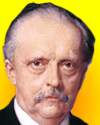 | When young Galileo, then a student at Pisa, noticed one day during divine service a chandelier swinging backwards and forwards, and convinced himself, by counting his pulse, that the duration of the oscillations was independent of the arc through which it moved, who could know that this discovery would eventually put it in our power, by means of the pendulum, to attain an accuracy in the measurement of time till then deemed impossible, and would enable the storm-tossed seaman in the most distant oceans to determine in what degree of longitude he was sailing? |
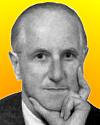 | [The unreactivity of the noble gas elements] belongs to the surest of experimental results. |
| Before you look at today's web page, see if you can answer some of these questions about the events that happened on this day. Some of the names are very familiar. Others will likely stump you. Tickle your curiosity with these questions, then check your answers on today's web page. | |
| Births | |
 | Sir Bernard Lovell, born 31 Aug 1913 is an English radio astronomer who was founder and director (1951-81) of a well-known England astronomical institution. What institution did he found? |
 | Hermann Ludwig Ferdinand von Helmholtz, born 31 Aug 1821, was a German scientist who made fundamental contributions to physiology, optics, electrodynamics, mathematics, and meteorology. He is best known for his statement of one of the fundamental laws of physics. What is this fundamental law? |
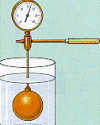 | Guillaume Amontons, born 31 Aug 1663, was a French physicist, who developed the air thermometer - which relies on increase in volume of a gas (rather than a liquid) with temperature - and used it (1702) to measure change in temperature in terms of a proportional change in pressure. He had a disability since childhood, which led him to work on inventions for people with this same disability. What was this disability? |
| Deaths | |
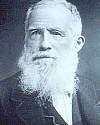 | Sir John Bennet Lawes (1814-1900) was an English agronomist who founded Rothamsted Experimental Station, the oldest agricultural research station in the world. He also founded an industry. What was the industry he founded? |
| Events | |
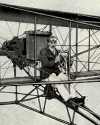 | On 31 Aug 1910, Hammond Curtiss began a biplane trip from Euclid Beach Park, Cleveland, Ohio, to Cedar Point, Sandusky, Ohio covering 70 miles in 78 minutes nonstop. What U.S. first did he establish with his flight? |
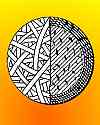 | On 31 Aug 1909, Benjamin Shibe recieved a U.S. patent for a method of making a baseball by winding soft india-rubber strands around a spherical core. (The Shibe Park stadium was named after him as the principal owner of the Philadelphia Athelics team. It later bcame the Connie Mack Stadium.) What material was used for the spherical core of Shibe's patented baseball? |
Fast answers for the previous newsletter for August 30: NOAA • ENIAC • “dirty snowball” • electron • sun.
 If you enjoy this newsletter, the website, or wish to offer encouragement or ideas, please send feedback by using your mail reader Reply button.
If you enjoy this newsletter, the website, or wish to offer encouragement or ideas, please send feedback by using your mail reader Reply button. Your click on a Facebook, StumbleUpon, or other social button on the site webpages is also a welcome sign of appreciation. Thank you for using them.
© This newsletter is copyright 2020 by todayinsci.com. Please respect the Webmaster's wishes and do not put copies online of the Newsletter — or any Today in Science History webpage. (If you already have done so, please remove them. Thank you.) Offline use in education is encouraged such as a printout on a bulletin board, or projected for classroom viewing. Online, descriptive links to our pages are welcomed, as these will provide a reader with the most recent revisions, additions and/or corrections of a webpage. For any other copyright questions, please contact the Webmaster by using your mail reader Reply button.
--
If you do not want to receive any more newsletters, Unsubscribe
To update your preferences and to unsubscribe visit this link
Executive Real Estate Business Class
-
"It was like a man with wings. It wasn't like anything you'd see on TV or in a monster movie." ...
About the publisher
Search This Blog
Blog Archive
-
▼
2021
(585)
-
▼
August
(32)
- Newsletter for Tuesday 31 August.
- Newsletter for Monday 30 August.
- Newsletter for Sunday 29 August.
- Newsletter for Saturday 28 August.
- Newsletter for Friday 27 August.
- Newsletter for Thursday 26 August.
- Newsletter for Wednesday 25 August.
- Newsletter for Tuesday 24 August.
- Newsletter for Monday 23 August.
- All-New Tonight: 'The Machines That Built America'
- Newsletter for Sunday 22 August.
- Newsletter for Saturday 21 August.
- Newsletter for Friday 20 August.
- Newsletter for Thursday 19 August.
- Newsletter for Wednesday 18 August.
- Newsletter for Tuesday 17 August.
- Newsletter for Monday 16 August.
- Newsletter for Sunday 15 August.
- Newsletter for Saturday 14 August.
- Newsletter for Friday 13 August.
- Newsletter for Wednesday 11 August.
- Newsletter for Tuesday 10 August.
- Newsletter for Monday 9 August.
- All-New Tonight 9/8c: Telephone Wars
- Newsletter for Sunday 8 August.
- Newsletter for Saturday 7 August.
- Newsletter for Friday 6 August.
- Newsletter for Thursday 5 August.
- Newsletter for Wednesday 4 August.
- Newsletter for Tuesday 3 August.
- Newsletter for Monday 2 August.
- Newsletter for Sunday 1 August.
-
▼
August
(32)
-
Blogroll
-
About
HistoryFact










0 comments:
Post a Comment